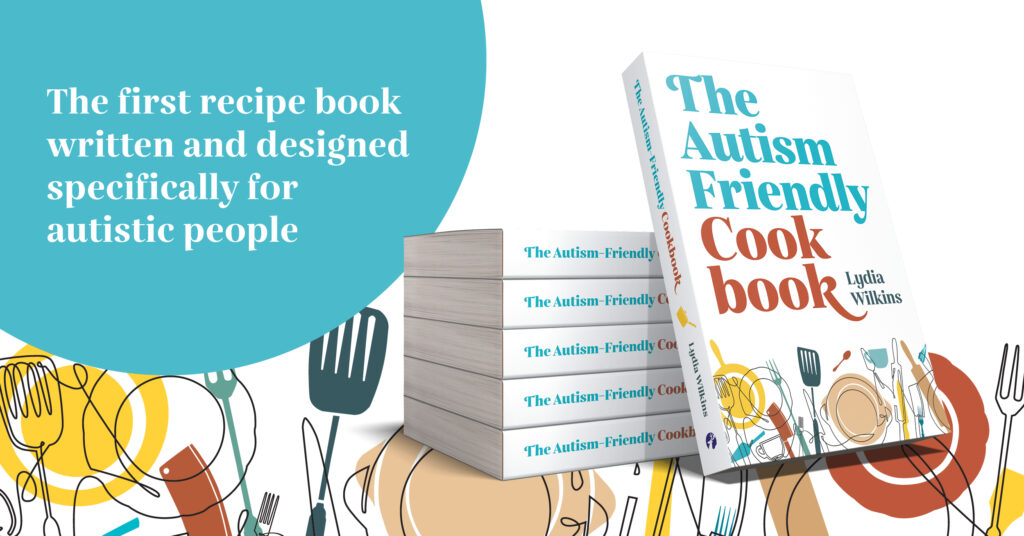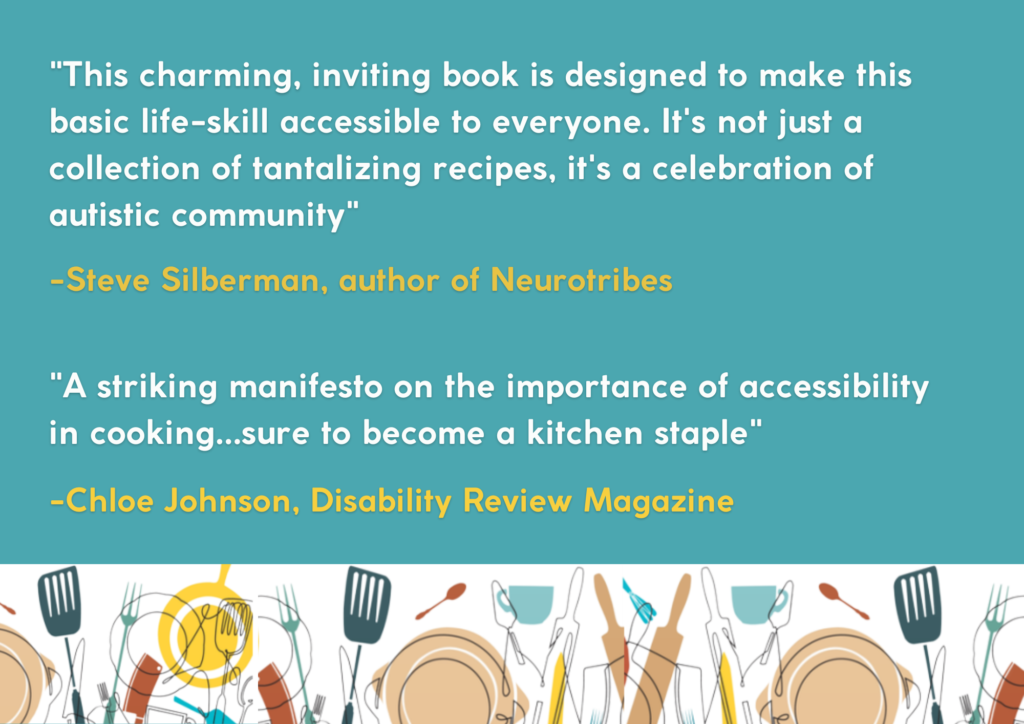From Innovative Idea to Reality: The Autism-Friendly Cookbook

Lydia Wilkins, author of The Autism-Friendly Cookbook – the first recipe book written and designed specifically for autistic people – tells us all about how this innovative, brilliant spark of an idea came to fruition.
If you had told the class of 2018 that – in just under 2 years – we’d have experienced a once-in-a-lifetime pandemic, our baby faces would have laughed themselves silly. Everyone needed a project for when the extreme lockdowns came, didn’t they? I’d have laughed even harder if you’d told me that the last 2 years would have seen me write a book, having always viewed that as what ‘proper journalists’ do. In a way, The Autism-Friendly Cookbook is the most ironic project I will probably ever work on – simply on the grounds that I am the world’s worst cook!
Back in 2015 – at the age of 16 – I was diagnosed as an Autistic person, having spent an inordinate amount of time being tested for unrelated conditions. By the proxy of the gender that I present as, it’s almost like having to go across some kind of invisible barrier on the pathway to diagnosis. Having lost count of the many “You’re female, you can’t be Autistic” conversations, it’s this sentiment that forms the background to the book. It was a spark of an idea.
The Autism-Friendly Cookbook has 100 recipes, 30 from other autistic people like: Laura James, author of Odd Girl Out; Dan Jones, YouTuber at The Aspie World; Siena Castellon, founder of Neurodiversity Celebration Week…
Between the odd pockets of times between lockdowns, I was informed that I was eligible for Personal Independence Payment (PIP), a form of disability benefit here in the UK. It is not related to work, is not means tested, and Autism counts legally as a disability, thanks to the Equality Act. Time to throw my hat into the ring! Knowing how difficult this is, I had known this would end up at the final stage of a tribunal; I have spent a chunk of my life having to justify the space I inhabit to the uninitiated and the ignorant, those who often gatekeep my access. I spend a lot of time trying to navigate the access issues, and it takes up so much of an emotional cost.
Of course, the first stage of the report would come back as a default negative – but the assessment for PIP was almost bitterly funny. I struggle in the kitchen; you may not see it, but dynamic disabilities/conditions are no less real because of their lack of disability. I have issues with my motor skills, timing of cooking, interoception – and I follow a restricted diet, due to a myriad of sensory issues. Just because I talk somewhat fluently, does not make me less Autistic! However, apparently, I could ‘just learn’ such skills – which is also not possible, due to a spiky profile. ‘Just learn’? By that proxy, I could ‘just learn’ how to be…well, non-disabled.
Speaking to a multitude of people personally and professionally, a universal experience started to take shape. There was a myriad of similar issues – very much in the same vein – and a resource was so clearly needed of all the relevant information in one place. I pitched the idea but didn’t really expect it to be accepted – it was more a release of frustration in having to justify myself once again, in spending time and an emotional energy that is not endless. I was surprised to find that this was signed for in early 2021.

The Autism-Friendly Cookbook has 100 recipes, 30 from other Autistic people like: Laura James, author of Odd Girl Out; Dan Jones, YouTuber at The Aspie World; Siena Castellon, founder of Neurodiversity Celebration Week; and others. There’s an energy metric for all recipes, along with a key for diet and sensory needs; if you want to learn more, the majority of the recipes have ideas about how to expand them and their presentation. The first part is also for parents/teachers/guardians/careers, in detailing what sensory issues are, as well as adaptations and how to implement some strategies in the kitchen.
Compiling this last year was… immense? Stressful? It was fun at times, and stressful all at once; 80,000 words is a lot. I still have stress dreams about if this will face legal action if I have not checked the facts enough, or if this could cause more harm than good. It’s not a neurodiverse cookbook, because encompassing a range of access needs would have been impossible to write – and I only have one diagnosis, making it an inappropriate space to inhabit. That being said, I would do it all again, and I would not think twice.
My sister asked me recently what this was like – to have spent lockdown writing, to hold something tangible in your hands. (In other words, she turned the tables on me – asking the questions of the journalist!) There is something quite edifying about this, in putting together something to throw back at the ridiculous. I also had a lot of fun as most recipes have a story attached to them. My oldest friend, Lalaine, is in the book; having caused friendly embarrassment while I was her work experience intern (we’ve been friends in the years since), a declaration was made to get my own back! I have never seen someone laugh so much whilst reading. One of my favourite restaurants is also in the book, too.
The Autism-Friendly Cookbook by Lydia Wilkins is available to pre-order.
If you liked this article, why not join our mailing list to receive exclusive content and discounts? Sign up to the mailing list here.